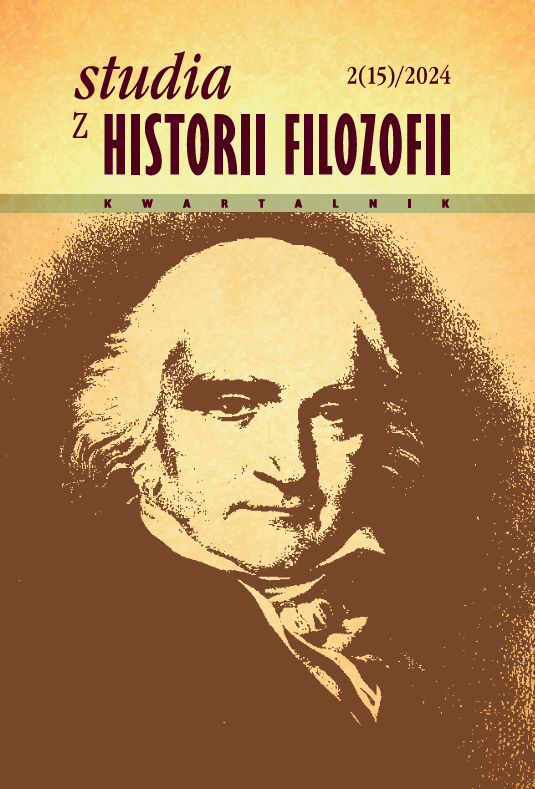Neokantyści Wilhelm Windelband, Heinrich Rickert i Ernst Cassirer wobec filozofii renesansu
DOI:
https://doi.org/10.12775/szhf.2024.010Słowa kluczowe
Neo-Kantianism, Renaissance, Immanuel Kant, Wilhelm Windel band, Heinrich Rickert, Ernst CassirerAbstrakt
Neo-Kantianism as a philosophical formation is characterised primarily by its reference to the philosophy of Immanuel Kant. Nevertheless, to say that the essence of Neo-Kantianism was solely a renewal of Kant's philosophy is insufficient. Also specific to this formation was the adaptation of Kant's thought to the new chalenges of philosophy at the turn of the nineteenth and twentieth centuries. A uniquely exciting analogy for Neo-Kantian philosophy is its reference to the thought of the Renaissance period. Just as the Renaissance marked the revival of many ancient philosophical currents (Platonism, Neoplatonism, Aristotelianism, Stoicism, Epicureanism, Scepticism and even Ionian natural philosophy) in the early modern period, Neo-Kantianism represented a kind of Renaissance of Kant’s philosophy. This affinity of thought is suggested by representatives of the two most important Neo-Kantian schools: Wilhelm Windelband, Heinrich Rickert and Ernst Cassirer. This article focuses on this historical-philosophical parallel by examining the relationship between Neo-Kantianism and Renaissance philosophy. The results show that Neo-Kantianism is not limited to an apologetic repetition of Kant’s philosophy but constitutes a heterodox and critical renewal of it. Such an apologetic approach did not work in modern philosophy, which is dominated by the spirit of criticism. Thus, the Neo-Kantian formation shows deep connections with other periods in the history of philosophy, such as Renaissance philosophy, as a breakthrough period initiating a modern mode of reflection. Understanding the relationship between Neo-Kantianism and other philosophical movements can help us appreciate the richness and complexity of contemporary philosophical thought.
Bibliografia
Bocheński Józef Maria. 1951. Europäische Philosophie der Gegenwart. Bern–München: Sammlung Dalp.
Cassirer Ernst. 1927. Individuum und Kosmos in der Philosophie der Renaissance. Leipzig: Teubner.
Fichte Johann Gottlieb. 2012. Kilka wykładów o powołaniu uczonego, oprac. Józef Kalasanty Szaniawski, przeł. Tomasz Kupś. Toruń: Wydawnictwo Naukowe Uniwersytetu Mikołaja Kopernika.
Gabriel Gottfried. 2007. Teoria poznania od Kartezjusza do Wittgensteina, przeł. Tomasz Kubalica. Kraków: WAM.
Goethe Johann Wolfgang von. 1999. Faust, przeł. Adam Pomorski. Warszawa: Świat Książki
Hanuszkiewicz Wojciech. 2013. „Ontologiczne założenia Platońskiej teorii idei w ujęciu Hermanna Lotzego”. Archiwum Historii Filozofii i Myśli Społecznej 58: 195–212.
Heis Jeremy. 2018. „Neo-Kantianism”. W: The Stanford Encyclopedia of Philosophy, red. Edward N. Zalta. Dostęp 7.04.2024. https://plato.stanford.edu/archives/sum2018/entries/neo-kantianism/.
Kijewska Agnieszka. 2009. Mikołaj Kuzańczyk. Kraków: WAM.
Kristeller Paul Oskar. 1988. „Humanism”. W: The Cambridge History of Renaissance Philosophy, red. Charles B. Schmitt, Quentin Skinner, Eckhard Kessler, Jill Kraye, 111–138. Cambridge: Cambridge University Press.
Kubalica Tomasz. 2009. „Stanowisko Immanuela Kanta wobec teorii odbicia”. Idea. Studia nad strukturą i rozwojem pojęć filozoficznych 21: 59–69.
Kubalica Tomasz. 2018. „Die Geschichte der Philosophie als Problemgeschichte”. W: Wilhelm Windelband (1848–1915), red. Peter König, Oliver Schlaudt, 169–196. Würzburg: Königshausen & Neumann.
Kubalica Tomasz. 2019. „Hermann Cohen i Ernst Cassirer w relacji mistrz–uczeń”. Studia Philosophica Wratislaviensia 14(3): 69–80.
Kubalica Tomasz. 2023. „Research on Neo-Kantianism as an Expression of Its Continuity”. Maszynopis złożony do publikacji.
Large Duncan. 2018. „The Translation of Philosophical Texts”. W: The Routledge Handbook of Translation and Philosophy, red. J. Piers Rawling, Philip Wilson, 307–323. London: Routledge.
Lembeck Karl-Heinz. 1994. Platon in Marburg: Platon-Rezeption und Philosophiegeschichtsphilosophie bei Cohen und Natorp. Würzburg: Königshausen & Neumann.
Mikołaj z Kuzy. 1997. O oświeconej niewiedzy, przeł. Ireneusz Kania. Kraków: Znak.
Monfasani John. 2019. „George of Trebizond”. W: Renaissance and Reformation, red. John Monfasani. Oxford: Oxford University Press.
Natorp Paul. 2016. Platos Ideenlehre: Eine Einführung in den Idealismus. Hamburg: Felix Meiner Verlag.
Noras Andrzej J. 2002. „Teoria dwóch światów: Lask a Hartmann”. W: Między kantyzmem a neokantyzmem, red. Dariusz Kubok, 93–111. Katowice: Wydawnictwo Uniwersytetu Śląskiego.
Noras Andrzej J. 2007. „Platoński Teajtet według Paula Natorpa”. W: Kolokwia Platońskie, red. Artur Pacewicz, 172–177. Wrocław: Wydawnictwo Uniwersytetu Wrocławskiego.
Noras Andrzej J. 2011. „Spór o metodę w filozofii przełomu XIX i XX wieku”. Folia Philosophica 29: 111–151.
Noras Andrzej J. 2012. Historia neokantyzmu. Katowice: Wydawnictwo Uniwersytetu Śląskiego.
Noras Andrzej J. 2015. „Początki filozofii Cohena a problem psychologii”. Kultura i Wartości 13: 153–170.
Olech Adam. 2001. Psychologizm – antypsychologizm. W setną rocznicę wydania „Logische Untersuchungen” Edmunda Husserla. Kraków: Aureus.
Rickert Heinrich. 1932. Goethes Faust. Die dramatische Einheit der Dichtung. Tübingen: J. C. B. Mohr (Paul Siebeck).
Sellars John. 2020. „Renaissance Humanism and Philosophy as a Way of Life”. Metaphilosophy 51(2–3): 226–243.
Swieżawski Stefan. 1983. Między średniowieczem a czasami nowymi. Sylwetki myślicieli XV wieku. Warszawa: Biblioteka „Więzi”.
Swieżawski Stefan. 2005. Zagadnienie historii filozofii, wyd. 2. Warszawa: Semper.
Tatarkiewicz Władysław. 1995. Historia filozofii, t. 2: Filozofia nowożytna do roku 1830. Warszawa: Wydawnictwo Naukowe PWN.
Windelband Wilhelm. 1902. Platon, przeł. Stanisław Bouffałł. Warszawa: Wydawnictwo Przeglądu Filozoficznego.
Windelband Wilhelm. 1915. „Goethes Faust und die Philosophie der Renaissance”. W: Wilhelm Windelband, Präludien, t. 1, 191–212. Tübingen: Mohr (Siebeck).
Windelband Wilhelm. 1920. Platon. Mit Bildnis. Stuttgart: Fr. Frommanns Verlag (H. Kurtz).
Pobrania
Opublikowane
Jak cytować
Numer
Dział
Licencja

Utwór dostępny jest na licencji Creative Commons Uznanie autorstwa – Bez utworów zależnych 4.0 Międzynarodowe.
Statystyki
Liczba wyświetleń i pobrań: 395
Liczba cytowań: 0



